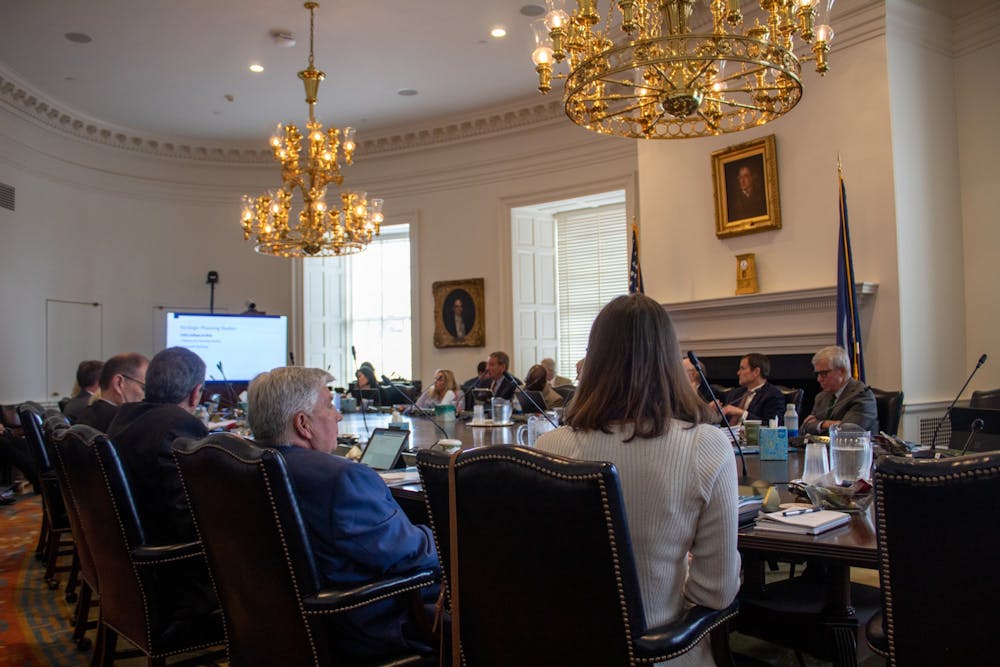The Board of Visitors affirmed the importance of various diversity, equity and inclusion initiatives across the University in the full Board meeting Friday from 1:45 p.m. to 3:30 p.m. Several members also debated tracking data related to political affiliations of faculty members as a form of measuring diversity.
University President Jim Ryan opened the discussion with an overview of the history and importance of diversity, equity and inclusion at the University. The University has formally engaged in DEI initiatives for the last 18 years, with a current annual budget — which supports the 55 dedicated DEI positions at the University — of about $5.8 million.
Board members — including Law alumnus Doug Wetmore, one of Governor Glenn Youngkin’s four most recent appointees — questioned why the University doesn’t track statistics of political ideologies of faculty members as part of their DEI efforts. He suggested a voluntary survey for faculty to self-identify their political standing.
“One of the critical things that a university has is a wide range of political ideas,” Wetmore said. “How come we don't have dashboards that track, for example, the political ideology of the faculty?”
The University currently operates a diversity dashboard that can be used to access the breakdown of different races among students, staff and faculty. The data ranges from 2009 to 2022 and includes a gender breakdown in addition to race.
While the University currently considers aspects of student’s backgrounds to build a “diverse student body” through the application process, many representatives said they were concerned over requiring faculty to disclose more personal information that may ultimately prove irrelevant.
Faculty representative Susan Kirk said she would be uncomfortable answering questions about being a Republican or Democrat because of how personal someone’s political ideology is.
At March’s full Board meeting, members endorsed a statement on free expression upholding the importance of First Amendment rights and inclusivity in the University setting. Members of the Board said they hoped to work with faculty to create environments where students feel comfortable expressing their diverse viewpoints.
Lillian Rojas, student member of the Board and rising fourth–year Batten student, said the political views of the faculty have never impacted her education, even while taking several political classes.
“In a lot of my classes, we actually are being pushed to think from the other side,” Rojas said.
Kevin McDonald, vice president of diversity, equity, inclusion and community partnerships, said information on professors’ political affiliations would have to be captured in a way that is not tied to the professors’ employment. He also said it’s important to understand what the University would want to do with that data.
During the meeting, Ryan referenced an article he had written in the Chronicle of Higher Education, in which he argued that institutions should not shy away from healthy evaluations of DEI programs, but should ultimately recognize their importance in creating a campus that attracts talented students and engaging ideas.
“We want to have a diverse and vibrant community,” Ryan said during the meeting. “We want to be a place where people feel welcome.”
The topic of DEI initiatives and their importance at the University is especially prevalent in light of two upcoming Supreme Court cases that may limit race-conscious university admissions. In a recent email to the student body, Ryan said that the University remains committed to diversity.
Ryan also said it’s important for universities to pay attention to honest critiques and be open to changes that might make them better at meeting the needs of the institutions. He added that he hopes the University can be a leader in this space and do DEI “a little bit differently” by engaging in community feedback.
In addressing diversity in regards to policing on Grounds, University Chief of Police Timothy Longo said that the composite of the police organization must reflect the diverse nature of the community in order to achieve effective results. Longo also said there will be a UPD seminar in August focusing on effective communication, active listening and transparency.
“I believe that these skills are especially important as we continue our work of re-establishing relationships across our community that may have broken down over time,” Longo said in reference to the seminar.
Director of Athletics Carla Williams also spoke on various DEI initiatives within her field, referencing several initiatives for student athletes including affinity groups, counseling and financial aid. Williams said services for student athletes, coaches and staff are to maximize their experience and contribute to the mission of the University and the athletics department.
“We aren't looking for ways to alienate or make anyone feel less than,” Williams said. “We're looking for ways to exist in excellence and we're looking for ways to win in life and in sports.
During the meeting, President Ryan also reminded members of the University’s ranking by Princeton Review as the No. 2 best value public university. Ryan said that the University has top graduation rates, retention rates, job placement rates and alumni network, which he attributes to the endowment.
The University currently has a roughly $13.6 billion endowment as of 2022 — which is notably more than the University of North Carolina’s endowment of $10 billion and James Madison University’s endowment of over $111 million. Additionally, the Board’s Finance Committee announced Friday that tuition would increase by 3 percent rather than 3.7 percent for in-state undergraduate students, per a request from the Virginia Secretary of Education.
“One of the reasons that we can have such a really strong combination of price and quality is because of the strength of our endowment,” Ryan said.
The Board will meet again in September.







